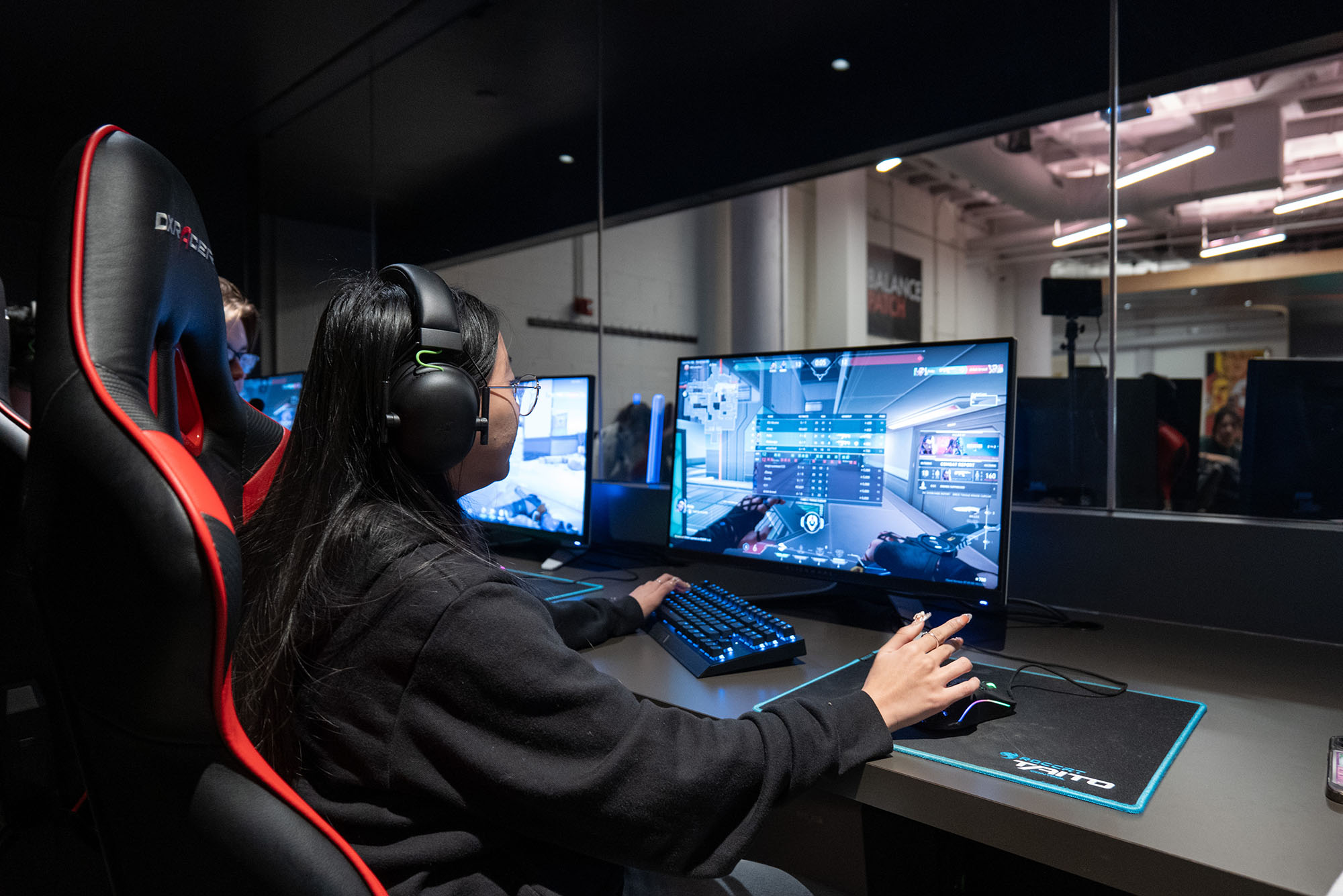Valorant, League of Legends, Overwatch: BU Gaming Plays Them All

“I’m just really happy that we’re able to bring everyone together like that,” says head competitive coordinator Jenny Tran (Questrom’25).
Valorant, League of Legends, Overwatch: BU Gaming Plays Them All
Thousands of Terriers find a sense of community playing video games
Jonathan Fang started playing video games as a kid when he was bored at summer camp. Now, as president of BU’s Gaming Club, he manages a group of 3,000 members strong. The club is a community of Terriers who play video games together casually; its elite players make up BU’s competitive esports team.
Fang (Questrom’24) says the exact number of students in the club is “pretty hard to gauge,” but the group is based around a massive online Discord server with about 3,000 members.
Fang’s goal as president is to balance the club’s competitive and casual sides, he says—and show support to both sides. Anyone can join the casual club, but scoring a spot on the competitive esports team requires potential players to impress club members in a rigorous tryout process.
Head competitive coordinator Jenny Tran (Questrom’25) says the team recruits its members and that the squad grows in membership every year. “We hold tryouts to see who meshes well,” Tran says. The team assesses prospects based not only on skill but also on how nice they are to their teammates and “who they are as a person,” she says.
Tran says the esports side, which consists of 60 to 80 players, is divided into subteams. Each subteam is assigned to compete in a specific game, such as Valorant, League of Legends, or Counter-Strike 2. She says each subteam bonds outside the club and that the Overwatch team is especially close-knit. “I’m just really happy that we’re able to bring everyone together like that,” she says.
Leo Chen (CAS’26) says he knew he would be the star of the Valorant team as soon as he made it through tryouts last year. He says being the ace is exciting because he gets to make flashy plays for the team to get hyped about. “There are high expectations [of] me,” Chen says. “I’m glad I deliver, though.”
Chen, alongside Valorant team captain Henry Nguyen (ENG’25), leads the Valorant squad through tournaments and matches against other colleges. On November 11, the team competed against squads from UMass Boston, UConn, and Bentley for a $500 first-place prize. Bentley knocked out BU in the first round, and UMass ultimately came away with the prize.
Nguyen says the competition is stiff in collegiate esports. “It’s a whole different game,” he says. “It’s not like where you play a ranked game online with some random people. It’s a lot more coordinated.”
“I just enjoy video games a lot because they take me to a whole different world.”
BU esports does all its recruiting internally, without the help of scouts. That’s why the tryout process, where the team can find star players like Chen, is so important, Nguyen says.
Chen has been playing Valorant since its release, but says it was a lot of work getting to where he is. He’s honed his skills over the estimated 2,000 hours he’s spent playing Valorant, he says, and another 5,000 playing Counter-Strike.
Both of those games have competitive teams within BU esports. Tran says deciding which games the team should play is a balancing act. They have to weigh player interest within the BU team against player interest within other collegiate teams and in the general public.
Fang says the Gaming Club welcomes players who want nothing to do with the competitive side of video games. Every year at Splash, BU’s twice yearly student activity fair, the club invites Terriers to join its Discord server, where they announce all of their events, and the team’s e-board stresses that not all its members have thousands of hours of experience or superhuman reflexes.
Just ask Liam Yorns (CAS’26), the Valorant squad’s coordinator. He plays games in his free time, but says he isn’t talented enough for the competitive squad. Instead, Yorns coordinates with other schools to organize events and matchups, all while doing what he loves: watching esports.
The Gaming Club hosts general meetings about twice a month. On November 18, they invited their casual players for a friendly competition against Boston College’s club at Balance Patch Cafe on Comm Ave, the club’s hangout of choice for its high-speed internet, dozens of desktop computers, and vast food menu.
Fang says the Gaming Club even accommodates players who do not play games on a PC. The group hosts events for console and mobile gamers, too. Earlier this month, they hosted a Genshin Impact event that garnered almost 300 sign-ups.
At the end of the day, Tran says, the club is really about fun, community, and a shared love for video games. “They take me to a whole different world, a whole different life,” she says.
Comments & Discussion
Boston University moderates comments to facilitate an informed, substantive, civil conversation. Abusive, profane, self-promotional, misleading, incoherent or off-topic comments will be rejected. Moderators are staffed during regular business hours (EST) and can only accept comments written in English. Statistics or facts must include a citation or a link to the citation.